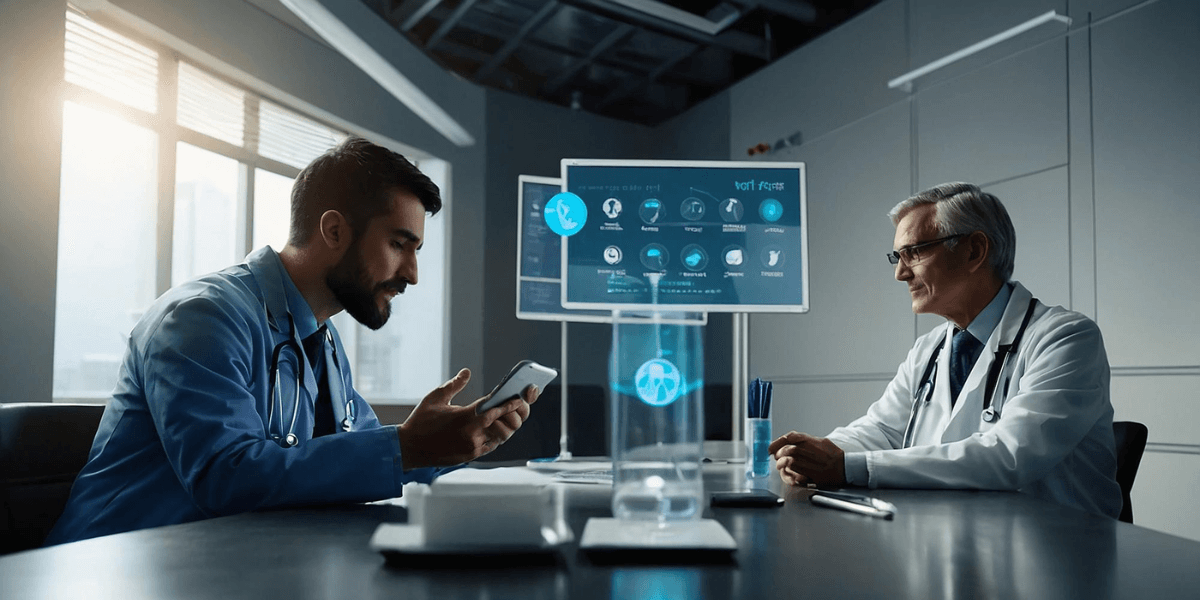Artificial intelligence in healthcare is no longer just a sci-fi gadget. It’s crunching numbers, spotting patterns, and smoothing out the rough edges of what used to be a clunky process. In the Lone Star State, where everything’s bigger, including the healthcare headaches, this tech is carving out a fresh path for brokers, sellers, and buyers alike.
The impact of AI on healthcare is being felt across hospitals, clinics, diagnostics, billing, and even predictive analytics. AI systems now assist in reading imaging scans, flagging clinical risks, optimizing scheduling, and directing care paths.
Table of Contents
ToggleHow AI Is Changing Medical Practice Brokerage in Texas
How is AI changing the healthcare industry? AI is driving one of the most profound economic shifts the healthcare sector has ever seen. As the generative AI healthcare market surpasses $2 billion in 2025, it signals a significant turning point, with forecasts predicting 146% growth through 2028 and a market exceeding $10 billion by 2030. This rapid expansion highlights both the growing sophistication of AI technology and the rising trust healthcare organizations place in AI-powered solutions, according to The Global Statistics.
Brokers here in Texas are tapping into algorithms that sift through mountains of data faster than you can say “bluebonnets.” No more wild guesses or dusty ledgers. Instead, we’re seeing tools that predict cash flows, flag hidden gems in patient rosters, and even simulate post-sale scenarios. It’s turning what was once an art into a blend of craft and computation, and Texas practices are reaping the rewards.
Below are several concrete ways this transformation is occurring:
1. Streamlining Valuations with Predictive Analytics
First off, valuations. Remember when pricing a practice meant poring over tax returns and whispering prayers to the revenue gods? Those days are fading fast. AI steps in with predictive analytics, absorbing financial histories, patient demographics, and even local market quirks, such as the impact of Texas oil booms on rural clinics.
Traditional methods might peg its worth at a flat multiple of earnings, but AI digs deeper. It cross-references billing codes against statewide trends, identifies inefficiencies such as underutilized Medicare slots, and produces a number that’s not only accurate but also forward-looking. By 2025, the generative AI healthcare market is projected to exceed $2 billion, a trend that medical practice brokers in Texas are watching closely as AI-driven valuation and analytics tools become increasingly essential in deal-making.
Tools like those from specialized healthcare fintech firms are already live, pulling from Texas-specific data sets to account for our unique regulations. Sellers walk away happier, buyers less skittish. The impact of AI on healthcare shines brightest here, enabling deals to close more quickly and fairly.
2. Enhancing Buyer-Seller Matching
Next up is matchmaking. Brokerage thrives on connections, but sifting through potential buyers and sellers used to feel like panning for gold in a muddy creek. In Texas, where urban sprawl meets wide-open spaces, precision is key; it saves travel time for viewings and filters out mismatches early.
Many physicians view AI as a powerful tool for reducing administrative workloads, which directly impacts the appeal and efficiency of medical practices being acquired or sold. In fact, 57% of doctors believe that automation, which reduces paperwork and documentation demands, offers the greatest opportunity for AI. Practices that adopt such systems become more attractive to potential buyers and brokers, and AI can use this operational data to improve matchmaking accuracy.
It’s not magic; machine learning analyzes anonymized deal histories, buyer preferences, and practice performance to refine recommendations. How is AI changing the healthcare industry? By turning cold leads into warm handshakes, one data point at a time.

3. Automating Due Diligence Processes
Due diligence. The phrase alone is enough to make eyes glaze over. It’s that marathon of audits, compliance checks, and liability hunts that can stall a sale for months. AI is crashing that party, automating the grunt work so humans focus on the big-picture judgments.
Bots will be reviewing contracts for red flags, such as outdated HIPAA clauses or Texas-specific licensing issues. They flag discrepancies in seconds, cross-checking against state databases. Brokers now utilize natural language processing to scan emails and notes, extracting insights on staff retention and payer mix shifts.
This automation doesn’t just save hours; it slashes errors. In a state as litigious as Texas, that’s gold. Artificial intelligence in healthcare is proving its mettle by streamlining processes and improving efficiency, especially as Texas ramps up AI-friendly laws for electronic records.
4. Forecasting Market Trends in the Lone Star State
Last but not least, crystal-ball gazing. Texas healthcare is a wild ride, with population booms in DFW and policy pivots from Austin. AI excels at forecasting, using big data to chart where the puck’s headed.
Healthcare practice brokers incorporate variables such as aging demographics or post-pandemic shifts to home care. The output? Heat maps of hot spots for sales, like rising demand for behavioral health practices in growing suburbs. This foresight ties back to the impact of AI on healthcare, empowering brokers to advise with data-backed confidence rather than hunches.
Benefits of Artificial Intelligence in Healthcare
Here is a list of 10 benefits of artificial intelligence in the healthcare sector:
- Speed of analysis: AI can process massive datasets far faster than human teams.
- Improved accuracy: Patterns or anomalies that humans might miss get flagged.
- Predictive insight: Forecasting future trends, payer shifts, volume changes.
- Automated report generation: Standard reports (financial, operational) are created automatically.
- Smarter matching of buyers and sellers: Better matchmaking algorithms.
- Risk quantification: Scoring models for potential downside.
- Lower transaction cost: Less time, fewer mistakes, less manual work.
- Better post-acquisition monitoring: Ongoing oversight of operations.
- Compliance alerts: Proactive detection of regulatory or billing irregularities.
- Adaptive learning: The system improves as more deals and outcomes are fed back.
These benefits contribute to more confident deal-making, more efficient transactions, and fewer surprises.
FAQs
Generally, you will need a state-issued home health agency license, business registration, tax ID, and possibly Medicare or Medicaid certification, depending on the services you provide and your location. Always check Texas Department of Health regulations for specifics.
AI can produce biased or incorrect outcomes if trained on poor data, leading to wrong decisions. It also raises concerns about data privacy, accountability, and regulatory compliance.
Pros include faster analysis, improved diagnosis, cost savings, and better decision support. Cons involve bias, errors, lack of transparency, high implementation costs, and data security challenges.
Start small, with pilot testing. Select tools that are transparent, explainable, have a good track record, and comply with regulations. Ensure staff training, maintain version logs, validate outputs periodically, and always maintain a human review stage.
Wrapping It Up: A Smarter Path Forward
So, what is the conclusion of AI in healthcare? It’s not replacing the human touch in medical practice brokerage; it’s amplifying it. Here in Texas, as we navigate fresh regulations and booming demands, AI is the quiet force reshaping how we buy, sell, and thrive. Practices fetch more accurate prices, matches click smoother, and the whole ecosystem pulses with efficiency. Risks hover, but with eyes wide open, the upside gleams. Embrace it thoughtfully, and watch your next deal soar.
Ready to grow your medical career and navigate this AI-infused landscape? Explore medical practices for sale in Texas and connect with Strategic Medical Brokers for a no-strings chat. Our team specializes in seamless transitions tailored to Texas’s unique vibe. Drop us a line today, and let’s turn your practice’s next chapter into a blockbuster.







